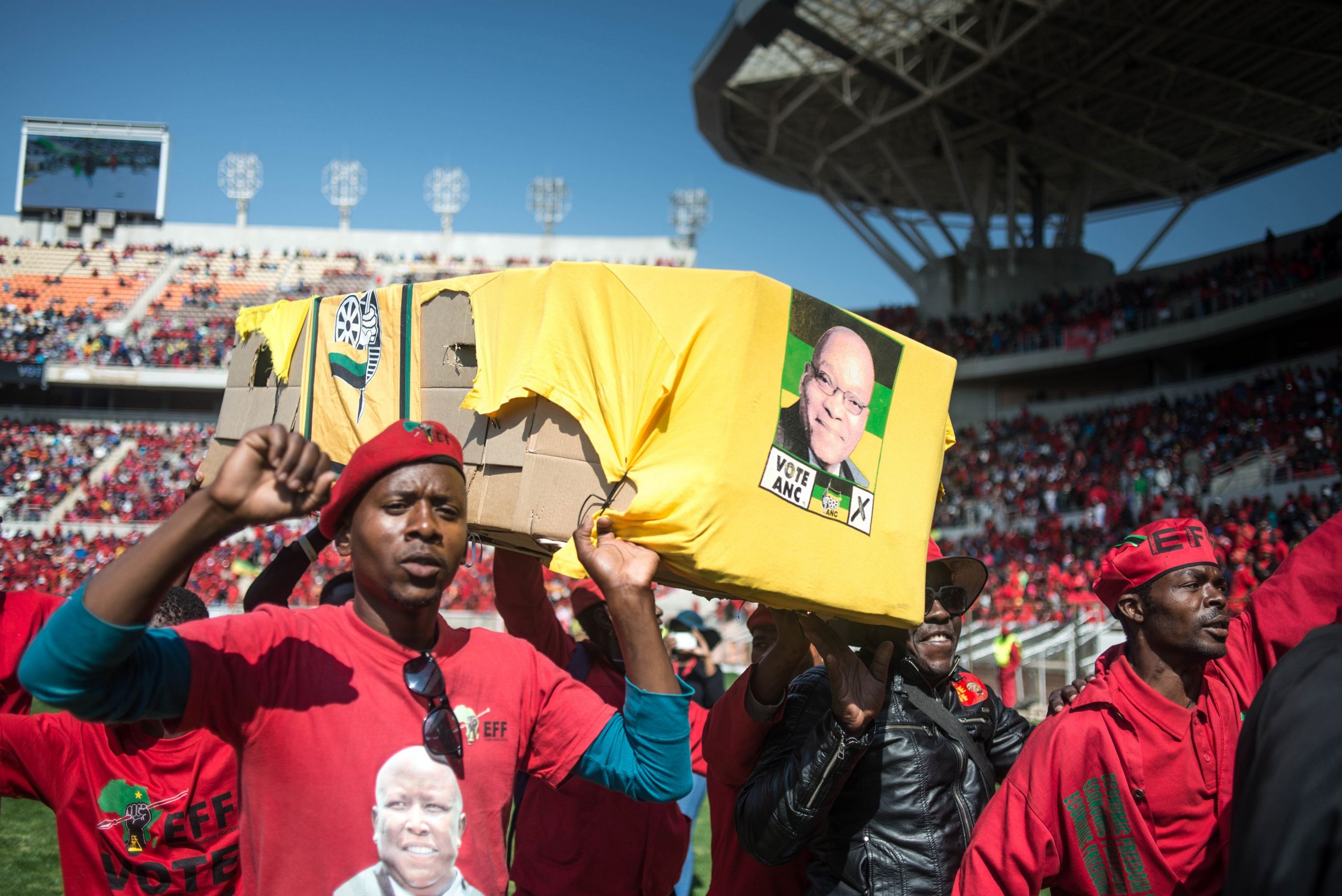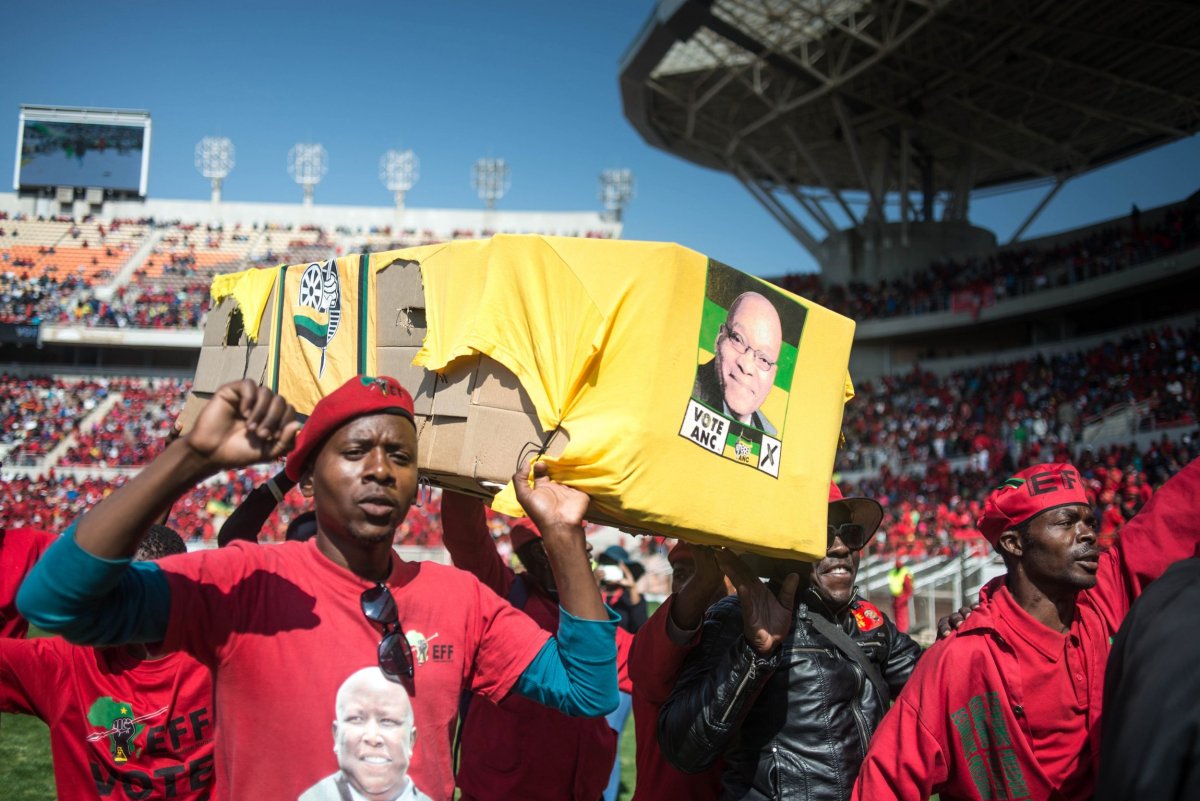
Wednesday's local government elections take place against the backdrop of what have been a turbulent few years for South African politics.
Local government, made up of eight metropolitan, 44 district and 226 local municipalities, is key to delivering basic services such as water, electricity, sanitation and roads to citizens. This level of government, however, has faced serious challenges with regards to capacity and corruption.
As the key delivery arm of the government, it is a rich source of wealth for those who seek to do business with the state. Too often, deals are characterized by kick-backs and most municipalities cannot account for how they've spent much of their money. For many of the 61,014 candidates contesting these elections, winning a seat may be their only access to a job in a country where over 36 percent of adults are unemployed. Those that do get elected, however, are often not able to fulfill the promises they made during electioneering. According to a November 2015 Afrobarometer survey, 61 percent of citizens "disapprove or strongly disapprove" of their local councillor's performance. That's hardly cheery news.
The governing African National Congress (ANC) has been under increased pressure as reports of high-level corruption and so-called state capture, evidenced by nefarious, politically driven business deals, hit the headlines almost daily. Mostly, the scandals have involved President Jacob Zuma, his inner circle of friends and political loyalists. Consequently, the past year has seen the party lurch from crisis to crisis as it has sought to defend the indefensible conduct of a deeply compromised president. As a result, Zuma's popularity has fallen to an all-time low of 27 percent among black South Africans, as of February, down from 43 percent in March 2015. The question, of course, is the extent to which Zuma's many scandals and an ailing economy will have any impact on the ANC at the polls.
The ANC as a brand may well transcend people's negative thoughts about the president's probity. Moreover, some voters may believe his supporters' attempts to blame the deteriorating economic situation on the impact of the global economy rather than poor leadership or policy incoherence.
As the ANC has continued to lose electoral support over successive national elections, three key metros have come under sharp focus during this election. In the metropolitan areas of Johannesburg, Tshwane and Nelson Mandela Bay, the ANC is gearing up for a tough electoral battle with two rivals: the center-right Democratic Alliance (DA) and the militant Marxist-Leninist inspired Economic Freedom Fighters (EFF).

The highly publicized electoral survey conducted by Ipsos/eNCA show the ANC's majority having waned considerably in each metropolitan area. In Tshwane/Pretoria, the country's capital that houses the seat of executive government, the last poll before the election showed party support for the ANC at 47 percent, the DA at 43 percent and the EFF at 9 percent. The situation was similar in Johannesburg, where the ANC polled at 46 percent, the DA at 41 percent and the EFF at 9 percent. In the hotly contested Nelson Mandela Bay, a large port city on the country's east coast, the DA sits in polls at 44 percent, the ANC at 37 percent and the EFF at 6 percent. A political party requires at least 50 percent in order to decisively win a local government area.
While this poll of key metros may look bad for the ANC, it is too early for the opposition parties to celebrate. The ANC is known for powerful last-minute electioneering, bolstered by a budget many times larger than that of its closest rivals, to convince a swathe of undecided voters to stick with its well-known brand. For example, the party managed to hire 2,000 buses to fill two large stadiums on the last day of electioneering on Sunday. Polls shows that, overall, the ANC will still receive about 54 percent of the total national votes cast, with the DA obtaining 26 percent and the EFF 8 percent. Having never before received less than 60 percent of the national vote in any election since the end of apartheid in 1994, however, a drop into the 50s will certainly be cause of great concern for the ANC.
The ANC under pressure has led to allegations of President Zuma using the race card by questioning black voters' loyalty in not wanting to vote for the ANC. This rhetoric of course undermines Nelson Mandela's legacy of reconciliation, but Zuma has never had a problem with sowing division. Zuma's rapacious tenure has resulted in a notable deterioration of many of the ANC structures. It has also caused discord in the ANC's ruling alliance with the Congress of South African Trade Unions (COSATU) and the South African Communist Party (SACP). To date, Zuma has always managed to force out those questioning his leadership typically using a divide-and-conquer approach towards holding on to power, regardless of the cost to the ANC and the country. Splits within the ANC have largely contributed to the record number of around 14 political assassinations in the run up to this poll. Most have taken place in the party's stronghold province of KwaZulu-Natal, with both victims and perpetrators typically belonging to different local factions of the ANC.
While the polls make for interesting political debates, voting day will bring the real reckoning. If indeed there are big surprises and the DA manages to pull off electoral victories in any of the metros, the question that springs to mind is, will the ANC will accept defeat?
What is more likely, however, is that these metros might not result in an overall victory for any one party—in which case coalitions will then be necessary to secure dominance in the council. The ANC, DA and EFF have not been in coalitions with each other before and have fought this election largely by attacking each other. Working across party lines takes a specific kind of generosity and maturity that has been sorely lacking in South African politics of late. It means that smaller parties may well stand the chance of becoming kingmakers where coalitions are needed. Decisions on this score may take into account a much bigger fight to be had in less than three years' time, when the 2019 National and Provincial elections will be held.
The 2016 elections will thus be a test for the ANC under pressure, but also for the future of South African opposition parties as they seek to capitalize electorally on a governing party which many believe has lost its way. The ANC has been declining in electoral dominance consistently since 2004. With each successive election, the proportion of voters who, due to their youth, are less tied to the history of the ANC as the liberator from apartheid, will grow. They are concerned with current issues such as unemployment, inadequate education, and poor infrastructure. Unless the ANC is able to reform itself and undo the damage done by the Zuma administration, it is likely that the party could find itself in serious trouble in the not too distant future.
Judith February and Gareth Newham are governance specialists at the Institute for Security Studies (ISS), an African security think tank based in Pretoria. The ISS tweets @issafrica.
Uncommon Knowledge
Newsweek is committed to challenging conventional wisdom and finding connections in the search for common ground.
Newsweek is committed to challenging conventional wisdom and finding connections in the search for common ground.
About the writer
To read how Newsweek uses AI as a newsroom tool, Click here.








